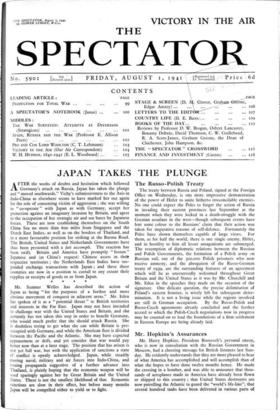The Russo-Polish Treaty
The treaty between Russia and Poland, signed at the Foreign Office on Wednesday, is one more impressive demonstration of the power of Hitler to unite hitherto irreconcilable enemies. No one could expect the Poles to forget the action of Russia in invading their eastern provinces last September at the moment when they were locked in a death-struggle with the Getnian assailant in the west—though subsequent events have lent some colour to the Russians' claim that their action was taken for imperative reasons of self-defence. Fortunately the Poles have shown themselves capable of large views. For them, as for half the world, there is one single enemy, Hitler, and in hostility to him all lesser antagonisms are submerged. The resumption of diplomatic relations between the Russian and Polish Governments, the formation of a Polish army on Russian soil, out of the 300,000 Polish prisoners who now receive amnesty, and the abrogation of the Russo-German treaty of 1939, are the outstanding features of an agreement which will be as unreservedly welcomed throughout Great Britain and the United States as it was by Mr. Churchill and Mr. Eden in the speeches they made on the occasion of the signature. One delicate question, the precise delimitation of Poland's eastern frontier, is wisely left for subsequent deter- mination. It is not a living issue while the regions involved are still in German occupation. By the Russo-Polish and Russo-Czech agreements already concluded and the further accord to which the Polish-Czech negotiations now in progress may be counted on to lead the foundations of a firm settlement in Eastern Europe are being already laid.


























